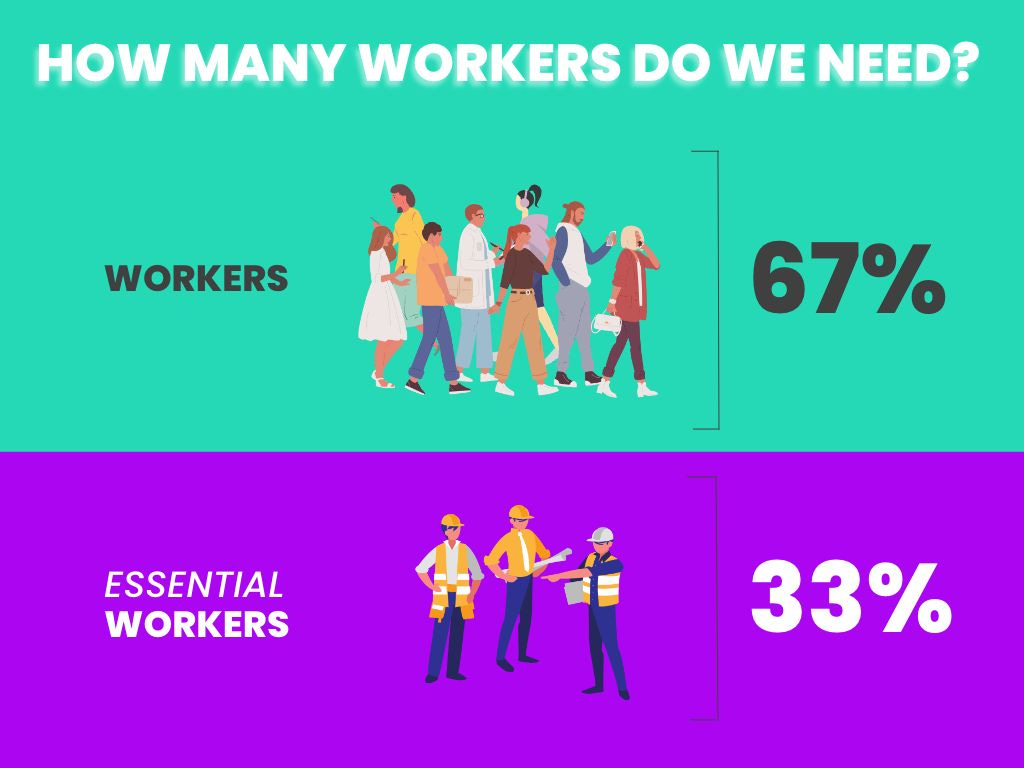If only we were able to know exactly how many workers it actually takes to keep the lights on in an advanced modern economy.
Then we would know when economists and politicians talk about the importance of full employment, whether they’re talking about personal preference, ideology, the need to give out meal tickets, or practical reality.
Oh wait. We do.
The Office of National Statistics (ONS) in the UK took data from just before the pandemic to advise the government on who should be considered ‘essential’ when society went into a sort of protective coma.
Quoting from their site: 1
In 2019, 10.6 million of those employed (33% of the total workforce) were in key worker occupations and industries.
The largest group of those employed in key worker occupations worked in health and social care (31%)
[end of quote]
To give you an idea of the type of people that were considered essential, these were the categories:
Health and social care
Education and childcare
Utilities and communication
Food and necessary goods
Transport
Key public services
Public safety and national security
National and local governments
Nope, I’m not on there either.
Now of course, it’s not possible that every other job is a bullshit job, (to borrow from David Graeber) because, without work above the essential level, we don’t do a lot of the things that are still important in the medium to long term.
But the point is that we already have a very clear outline of the things we cannot compromise on. Essential work is what either we need human beings to do or we need a smaller number of humans and an increased amount of automation to do.
By automation I mean everything from a medical advisor with AI-assisted diagnosis software instead of doctors doing triage to drones for doing repairs on telecommunications masts.
Here’s my controversial take: Let’s make essential work as desirable as possible for those doing it (because it is absolutely not optional). Make it better paid and fractional, ie, possible to be shared across the week by two or more people. Then automate as much as possible so that the actual labour cost is as low as it can be. And if private enterprise can’t provide that, make it a universal basic service.
Now I’m not actually a fan of the UBS idea per-se because it seems to me the way it’s presented is that it’s a committee of people deciding what services everyone needs. A Dividend or UBI on the other hand lets people work out what they need and gives the private sector the income to provide it.
But the sheer complexity of things like national health and the complete waste that comes from multiple layers of private company admin and paperwork means that building UBS options for the essential work economy can’t be off the table.
Everything else is important but optional. I don’t mean that insurance brokers are completely optional, I just mean we may not need as many of them. The same goes for the likes of fancy dress shops and social media managers.
And I don’t mean society is healthier in the long term without them. We need to dress up like idiots sometimes and have a party and we also need to be able to have services like that put in front of us on Instagram when we are planning a Stranger Things-themed night. But those things can be automated up to the point that people create a demand for those things and that other people want to do them. And the market is pretty good at sorting out a fair price when it’s not a matter of survival.
If 66% of work is non-essential, let’s start working out how to automate as much of the economy as we can, make the remaining work fractional and start freeing human beings with a Dividend for all.
https://www.ons.gov.uk/employmentandlabourmarket/peopleinwork/earningsandworkinghours/articles/coronavirusandkeyworkersintheuk/2020-05-15






One thing that is essential but is really assumed to be optional is the rigorous and determined checking by accounting and audit staff. It is also time consuming and the detailed work can, and often does, reveal serious errors and theft which hide behind a cursory check.